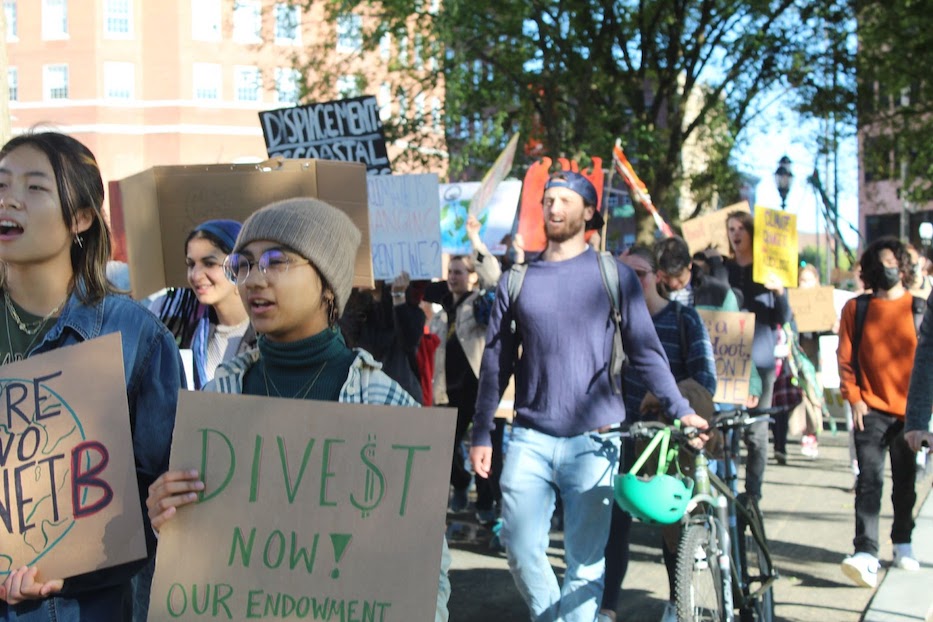
Culture & Community | Downtown | Environment | Youth Arts Journalism Initiative | New Haven Climate Movement
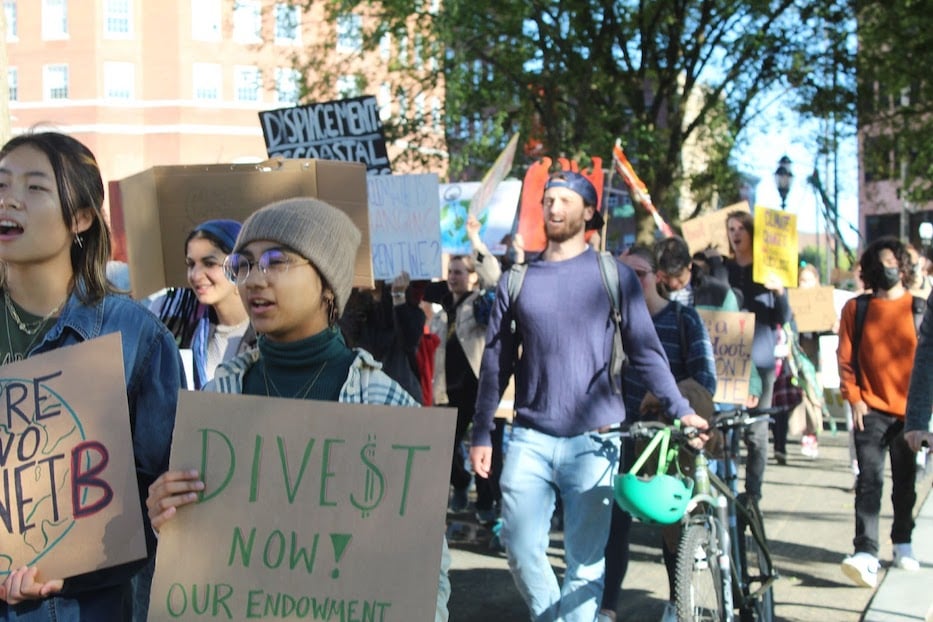
Strike participants marching. Abiba Biao Photos.
A voice rang out on the steps of City Hall as hundreds of New Haveners gathered shoulder-to-shoulder. All ears turned towards Dave John Cruz-Bustamante.
“Become the climate revolution you want to see today, tomorrow, and forever,” they began. “Become the climate revolution at your homes, at your schools, at your workplaces, at your churches, on your blocks. Talk about it and embody it so much that it’s no longer comfortable for others to stay silent and do nothing.”
A climate revolution took downtown New Haven by storm last Friday afternoon, as 100 protesters gathered on the New Haven Green for “Stop Climate Freefall,” an hours-long strike, rally, and “die-in” from members of the New Haven Climate Movement (NHCM). The day marked a Global Climate Strike, meaning that towns and cities across the world participated in similar actions.
NHCM holds these climate strikes annually in alignment with #FridaysForFuture, a climate movement that sets worldwide days of climate action demonstrations in March and September.
“The youth are raising their voices and demanding climate justice, yet adults in power refuse to listen,” said Young In Kim, a member of the NHCM who is a senior at Wilbur Cross High School. “They turn a blind eye and abandon all accountability. How sad is a world where teenagers must scream and shout for their futures, yet no one listens? Adults insist that student voices matter to them, yet we are left fending for our very own planet.”
While climate activism reaches back centuries—and has long been a cause taken up by Black people, non-Black people of color, mothers, and poor workers—the #FridaysForFuture movement originated from Swedish environmental activist Greta Thunberg, who at 15 years old began her weeks-long protests outside the Swedish Parliament in 2018. Images of her endeavor quickly went viral on social media and motivated young people all across the world to partake in civil disobedience to hold their government responsible for climate change.
In New Haven, Friday’s march began at Church and Chapel Street, moved to Phelps Gate on Yale University’s campus, went on to Center Church on the Green, and then ended at New Haven City Hall. The strike featured speakers from Save the Sound, Yale Student Environmental Coalition, Yale Endowment Justice Coalition, New Haven Board of Education student representative Cruz-Bustamante, and New Haven Mayor Justin Elicker.
Throughout the rally, members of NHCM reiterated the group's four demands. They include improved public transportation infrastructure, electrification of buildings and vehicles, government accountability on state and municipal levels, and increased climate education in public schools.
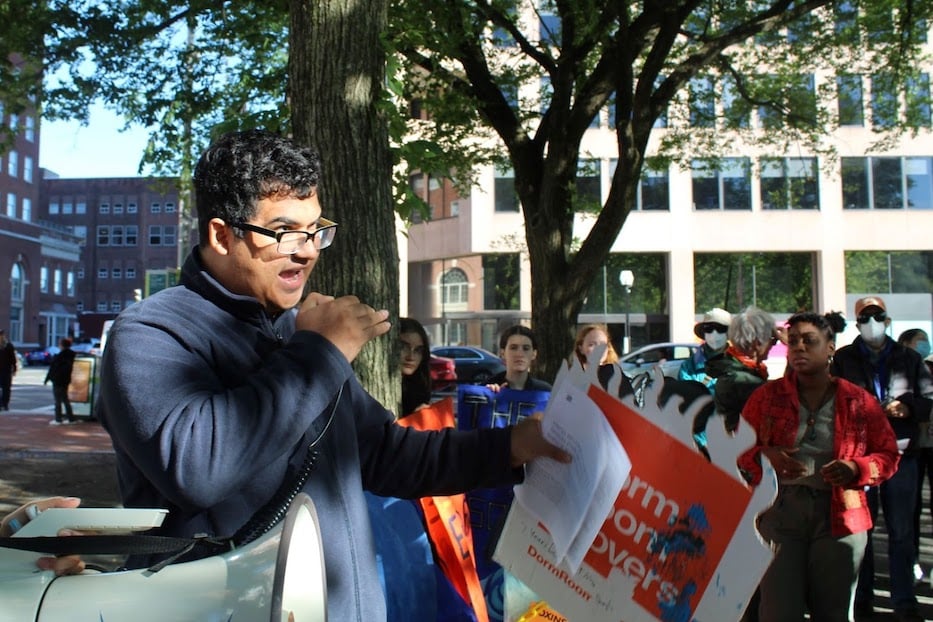 Save the Sound Environmental Justice Specialist, and Connecticut Equity and Environmental Justice Advisory Council member, Alex Rodriguez.
Save the Sound Environmental Justice Specialist, and Connecticut Equity and Environmental Justice Advisory Council member, Alex Rodriguez.
Alex Rodriguez, environmental justice specialist for Save the Sound and member of the Connecticut Equity and Environmental Justice Advisory Council, pointed to a list of breakthroughs on state environmental policy. They include S.B 10, an act that requires Connecticut to procure 100 percent from clean energy resources by 2040; the passage of the Connecticut Clean Air Act which mandates the state to have a 100 percent electric vehicle fleet by 2035; and the passage of a law that will require all Connecticut public schools to teach students about climate change by July 2023.
The sound of noisemakers and cheers followed each time he listed an achievement.
Rodriguez emphasized the importance of amplifying historically marginalized voices in climate advocacy. He stressed that “youth and BIPOC communities are the most disproportionately impacted by climate change and environmental pollution.”
“I want you to keep doing everything in your power to support the capacity of youth activists in Connecticut and BIPOC activists because this is our future on the line,” Rodriguez said to the crowd. “I see many young faces here in the crowd and I want you to keep up with the fight because there is no planet B.”
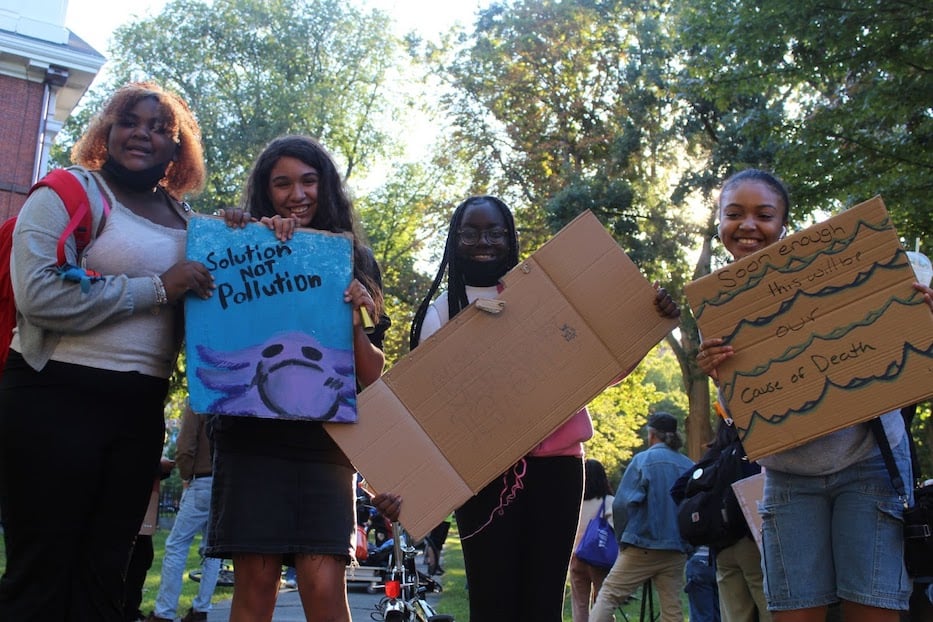
Common Ground freshman Layla Wilkins, Miliangelis Diaz, Kishara Heath, and Aaliyah Jones.
In search of a platform to voice their environmental concerns and demand for climate action, a group of freshman Common Ground High School attended the event. In high spirits, they waved their signs while making noise with party horns and noisemakers after each speech and chant.
Jennifer Lopez, a freshman at Common Ground, said she joined the strike to go out to help the local New Haven community.
“We want to help out the community and we know that everything we need to say we need to say directly to the mayor,” she said. Jennifer’s personal environmental concern lies with emitters of air pollution such as incinerators, and finding more sustainable ways to dispose of trash.
“Don't send out all our stuff to the incinerator,” she said. “ It's affecting everyone who lives near the incinerator, and it's causing more … asthma and more illnesses.”
Miliangelis Diaz focused on climate action on an individual level, including the cleanliness of New Haven’s collective environment and reduction of plastic containers and packaging, single use or otherwise.
“We need to clean up our parks. We need to stop using plastic things,” she said.
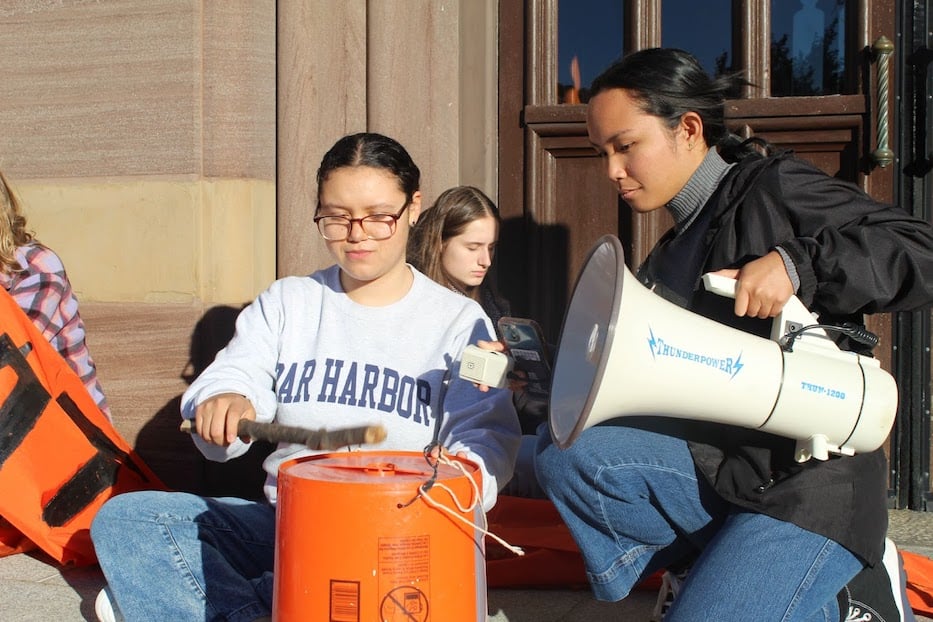
NHCM member Kiana Flores playing 40 drum beats, alongside NHCM member Patrica Joseph broadcasting the sound through a megaphone.
The strike ended with a moment of silence and die-in in front of New Haven City Hall. Lining the steps up to the building, climate activists turned musicians took their place at overturned orange buckets, transforming them into a percussion section. As the steady sound of 40 drum beats rang out over city hall, activists decried “each year of inaction since 1982.”
That year marks, among other thimgs, the first time Exxon acknowledged the precipitous and alarming rate of climate change. Four decades later, the globe is continuing to warm rapidly with the burning of fossil fuels.
“New Haven has the opportunity to be a leader in taking charge of climate action if we make these plans now. More than the opportunity–New Haven needs to be a leader in climate legislation,” said NHCM member and Yale first year Elisa Cruz.
“This city is a coastal town, making the impacts of climate change more prevalent here than in others, and this city is a town with a high population of people of color, meaning the impacts of climate change will exacerbate the citizens of this city more than in others. If we wait around for neighboring legislation to start making change, it will already be too late.”
Abiba Biao is a graduate of the Arts Council's Youth Arts Journalism Initiative and has stayed on with the Arts Paper as a freelance writer and photographer. She is beginning her freshman year at Southern Connecticut State University (SCSU) this fall.

